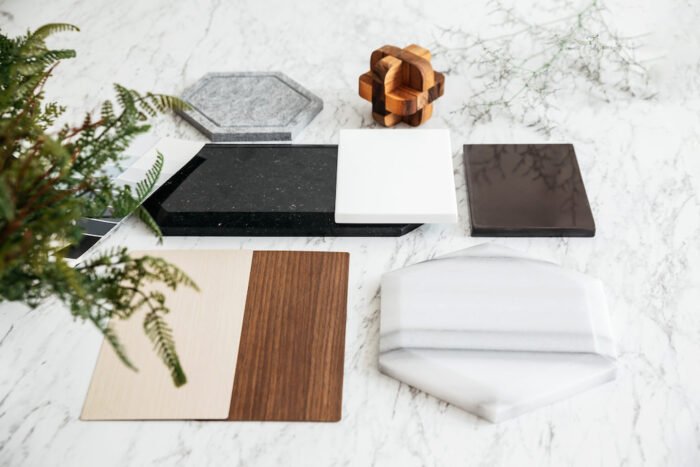There are numerous choices to make when upgrading your kitchen or building a bespoke house. A kitchen remodel lets you construct your dream kitchen. Today, one of the most significant considerations that a homeowner will make is how to pick a countertop material.
From quartz composites to acrylic sheets to genuine stones, the possibilities are nearly unlimited. With so many countertop material possibilities at your fingertips, it can be tough to pick an option that fulfills the aesthetic and practicality that you seek. For starters, our experts have outlined several choices.
Natural Stone Kitchen Countertops
Natural stone countertops are our first category. As the name says, these countertops are fully natural and provide a distinct aspect to the environment.
Granite
Granite countertops have become increasingly popular in kitchens. Granite is graded 1–5. Patterns, thickness, and color affect the rating. The thickness is a key aspect of what influences the cost of the granite.
Granite is heat- and scratch-resistant and low-maintenance. Granite is permeable and must be resealed to retain its surface. Unsealed, it might discolor permanently.
Marble
Marble makes beautiful sculptures and pillars. This sensation of grandeur is what makes so many homeowners drawn to utilizing marble in their kitchens. It’s a common kitchen countertop material. Marble is often beige, creamy white, black, or gray. You choose a stunning black marble slab to contrast your white kitchen cabinetry.
When you’re picking the marble, you’ll notice a selection of possibilities, many on the more costly side.
Marble countertops require maintenance. Clean marble countertops with water and mild liquid detergent. Sealing marble annually prevents deterioration. Marble scrapes and stains more than other materials.
Marble is high-maintenance and not ideal for a busy kitchen. If you’re a baker, marble makes rolling out bread and cookie dough easier.
Soapstone
Consider soapstone for kitchen counters. It is generally greenish-black in hue, but, it’s possible to find lighter green-gray slabs as well. Mineral oil seals this porous substance to prevent discoloration.
Slate is a thick stone with faint red, gray, green, purple, and black colors. It’s also possible to produce hues of variegated and mottled purple; these variants feature visible veins and contrasting colors. Slate scratches readily despite its bulk. While slate has a soft-matte shine, it’s easy to create a “wet” impression by pouring lemon oil on the top.
Quartz Kitchen Countertops
Consider engineered stone (quartz composite) for your kitchen countertop. Quartz with acrylic or epoxy binder makes this a stunning substance. Corian, Formica Solid-Surfacing, and Silestone are common quartz composites.
Engineered stones are harder. They have depth, clarity, and brilliance, unlike solid surfaces. Engineered stone has various advantages, including its durability. Its low upkeep makes it ideal for high-traffic areas and families. Engineered stone has drawbacks, including its high cost.
Solid Surface Countertops
Solid surface countertops are comprised of polyester, thick acrylic, or both. These countertops come in many colors and designs. Choose the appropriate Denver countertop designs for your dream kitchen. You can fix severe scratches and gouges.
Solid surface countertops are suitable for lengthy sections or large islands since their seams are bonded to hide joints. Many homeowners match or contrast their sinks with their countertops.
Glass Countertops
Glass countertops are another option. Glass is transparent and will enhance your decor. Glass countertops come in numerous hues and textures, including browns, greens, and blues. Glass countertops fit any kitchen color pallet.
Recycled glass countertops exist. This eco-friendly choice mimics granite surfaces. Recycled glass fragments provide this effect. Concrete, resin, or tiles are recycled glass surfaces.
Installing glass countertops may be costly. If your budget is low, use glass counters as an accent piece with a cheaper surface.
Glass countertops are heat-resistant, non-porous, and durable. However, they are more costly to install and chip readily.
Concrete Tops
Many homes have used concrete for kitchen worktops, creating distinctive and lovely spaces. Concrete countertops are adaptable to numerous styles. Since each countertop is handcrafted, it can feel natural. Concrete may be stained in almost any color.
Concrete countertops can be textured or imprinted. In a seaside house, you might want to add recycled glass or seashells to your concrete worktops.
Concrete is an eco-friendly option for environmentally conscious households. For a unique look, use wood chips or other reclaimed materials.


